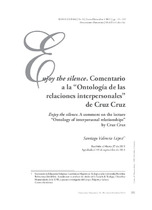| dc.contributor.author | Valencia López, Santiago | |
| dc.coverage.spatial | Seccional Medellín | spa |
| dc.date.accessioned | 2021-02-05T20:34:30Z | |
| dc.date.available | 2021-02-05T20:34:30Z | |
| dc.date.issued | 2011 | |
| dc.identifier.uri | http://hdl.handle.net/20.500.11912/7905 | |
| dc.description | p. 111 - 119 | spa |
| dc.description.abstract | Este escrito es un comentario al curso Ontología de las relaciones interpersonales dirigido por el Doctor Juan Cruz Cruz, profesor de la Universidad de Navarra, a finales de Mayo de 2011. La intimidad, como modo de ser profundo y de relacionarse con los demás en la gratuidad, conduce al ser humano a la búsqueda de un ámbito en el que pueda encontrarse a solas consigo mismo: el silencio, el cual, como estructura de direcciones amorosas, se construye a partir de la capacidad individual y se configura por una vocación única, negando la errónea concepción del “callar” para anular la relación con el otro y huir de las responsabilidades sociales. Una forma espiritual y novedosa de comprender estas palabras se expresa en Enjoy the Silence, una de las canciones más famosas de los 90´s, compuesta por Martin Gore, interpretada por la banda británica Depeche Mode y llevada a la pantalla por Anton Corbijn. La inspiración de esta letra, que se entona en las notas musicales del género electrónico, deja entrever un mensaje que se dirige en la misma dirección de las investigaciones del profesor Cruz. | spa |
| dc.description.abstract | This paper is a comment on the lecture Ontology of interpersonal relationships, leaded by Doctor Juan Cruz Cruz, professor at the University of Navarra, during the last days of May 2011. Intimacy, as a way of being deep and of relating to others in gratuity, drives the human beings into the search for an environment in which they can find themselves alone: silence, which as a structure of loving directions, is built from the individual capacity and is set by a unique vocation, denying the mistaken conception of “being quiet” to overturn the relationship with others, and to run away from social responsibilities. A spiritual and innovative way to understand these words is expressed in Enjoy the Silence, one of the most famous songs of the 90´s, written by Martin Gore and played by the British band Depeche Mode, and brought to the big screen by Anton Corbijn. The inspiration for these lyrics, which are intonated with the notes of the electronic music genre, allows a glimpse of a message that is addressed towards the same direction as the research by Professor Cruz. | spa |
| dc.format.mimetype | application/pdf | |
| dc.language.iso | spa | |
| dc.publisher | Universidad Pontificia Bolivariana | spa |
| dc.relation.ispartof | Pensamiento humanista | spa |
| dc.rights | Attribution-NonCommercial-NoDerivatives 4.0 International | * |
| dc.rights.uri | http://creativecommons.org/licenses/by-nc-nd/4.0/ | * |
| dc.subject | Ontología | spa |
| dc.subject | Interpersonalidad | spa |
| dc.subject | Intimidad | spa |
| dc.subject | Soledad | spa |
| dc.subject | Silencio | spa |
| dc.subject | Ontology | spa |
| dc.subject | Interpersonal | spa |
| dc.subject | Intimacy | spa |
| dc.subject | Solitude | spa |
| dc.subject | Silence | spa |
| dc.title | Enjoy the silence. Comentario a la “Ontología de las relaciones interpersonales” de Cruz Cruz | spa |
| dc.title.alternative | Enjoy the silence. A comment on the lecture “Ontology of interpersonal relationships” by Cruz Cruz | spa |
| dc.type | article | spa |
| dc.rights.accessRights | openAccess | spa |
| dc.type.hasVersion | publishedVersion | spa |
| dc.description.sectional | Medellín | spa |
| dc.identifier.instname | instname:Universidad Pontificia Bolivariana | spa |
| dc.identifier.reponame | reponame:Repositorio Institucional de la Universidad Pontificia Bolivariana | spa |
| dc.identifier.repourl | repourl:https://repository.unab.edu.co/ | |


